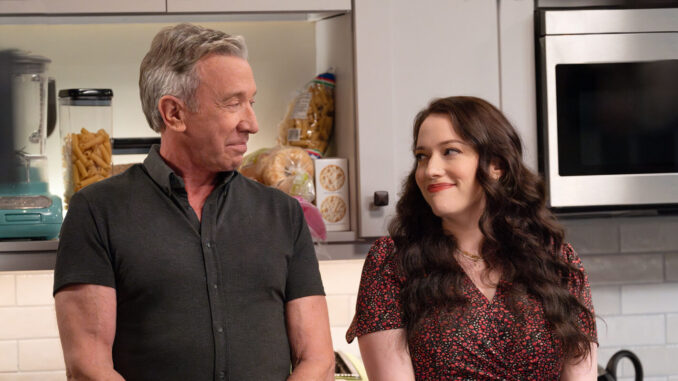
The television landscape, much like life itself, often cycles through comforting rhythms. Familiar faces return, sometimes in new guises, sometimes rekindling old flames. The news of Tim Allen and Kat Dennings potentially reuniting on screen, this time as a father and daughter, sparks not just a nostalgic flicker but an intriguing comedic anticipation. This isn't merely a retread of comfortable sitcom tropes; it promises a "fresh twist," a dynamic alchemy born from the collision of two distinctly powerful comedic energies.
Tim Allen, for generations, has embodied a particular brand of American masculinity: the gruff, well-meaning, slightly bewildered father figure who doles out wisdom alongside DIY tips. From the primal grunts of "Tool Time" to the grounded common sense of "Last Man Standing," Allen’s comedic persona is built on relatable exasperation, a love for "more power," and an observational humor that often borders on the curmudgeonly. He represents a certain traditional bedrock, a practical, no-nonsense approach to life, often finding humor in the absurdities of modern living through a lens of classic values. His appeal lies in his comforting familiarity, like a well-worn leather armchair you can always sink into.
Kat Dennings, on the other hand, is the quintessential voice of modern, whip-smart cynicism. Her characters, from the sharp-tongued Max Black of "2 Broke Girls" to the brilliantly sarcastic Darcy Lewis in the MCU, are defined by their rapid-fire wit, deadpan delivery, and a jaded yet oddly vulnerable worldview. She punctures pomposity with a glance, disarms with a perfectly timed quip, and often serves as the sardonic, articulate narrator of whatever chaos surrounds her. Dennings embodies a contemporary spirit: intelligent, independent, and unafraid to call out the absurdities she perceives. Her humor is intellectual, often relying on wordplay and a quickness of thought that can leave others a step behind.
The "fresh twist" then, lies not just in the generational gap – a sitcom staple – but in the specific juxtaposition of these two finely honed comedic styles. Imagine Allen’s character, perhaps a retired tradesman or an old-school business owner, trying to impart a nugget of hard-won wisdom, only to be met by Dennings’ character, perhaps a struggling artist, a tech entrepreneur, or a social media influencer, with a withering, perfectly articulated counterpoint that dismantles his premise with surgical precision.
This isn't just the boomer dad versus the millennial daughter. It’s the rumble of an old V8 engine meeting the silent hum of an electric car. It’s the practical application of a wrench against the theoretical elegance of a complex algorithm. The humor would emerge not just from their differences, but from the unexpected moments of shared humanity. Picture Tim Allen's character attempting to navigate a dating app, bewildered by the jargon, only for Kat Dennings' character to offer surprisingly empathetic, albeit sarcastic, guidance. Or, conversely, Dennings' character facing a real-world problem—a broken-down car, a home repair—where Allen’s fundamental, hands-on knowledge becomes undeniably invaluable, leading to a grudging but heartfelt respect.
The "twist" could also be in the power dynamic itself. What if the daughter is, in some ways, more "successful" or established in her own quirky niche, and the father is the one who needs to adapt to her world, rather than vice versa? This could force Allen’s character to confront his own ingrained biases or technological illiteracy, leading to genuinely funny and often poignant moments of vulnerability and growth. The daughter, for her part, might find herself unexpectedly leaning on her father's understated wisdom or unwavering support, peeling back layers of cynicism to reveal a deeper affection.
An illustrative example: A scene where Tim Allen's character, exasperated by a smart home device, resorts to shouting at it, while Kat Dennings' character calmly corrects his phrasing, explaining the nuanced logic of AI. The humor wouldn't be in the simple clash, but in the father's frustrated grunts slowly morphing into reluctant acceptance, and the daughter's dry commentary gradually revealing an underlying, amused affection for her father's analog charm. Or perhaps they are forced to co-run an unlikely business – an antique shop meets a podcast studio – creating a constant source of friction and eventual, surprising synergy.
This father-daughter pairing offers a rich comedic vein to mine. It's the comfort of a familiar melody infused with a surprising new harmony. The "fresh twist" isn't a gimmick; it's the inherent comedic potential of two titans of television comedy, each with a distinct and beloved persona, being placed in a relationship designed to bring out their best, most authentic, and most hilariously contrasting qualities. It promises a show that is both comforting in its casting and bracingly sharp in its wit, proving that sometimes, the freshest stories are told when classic energies collide in unexpected ways.